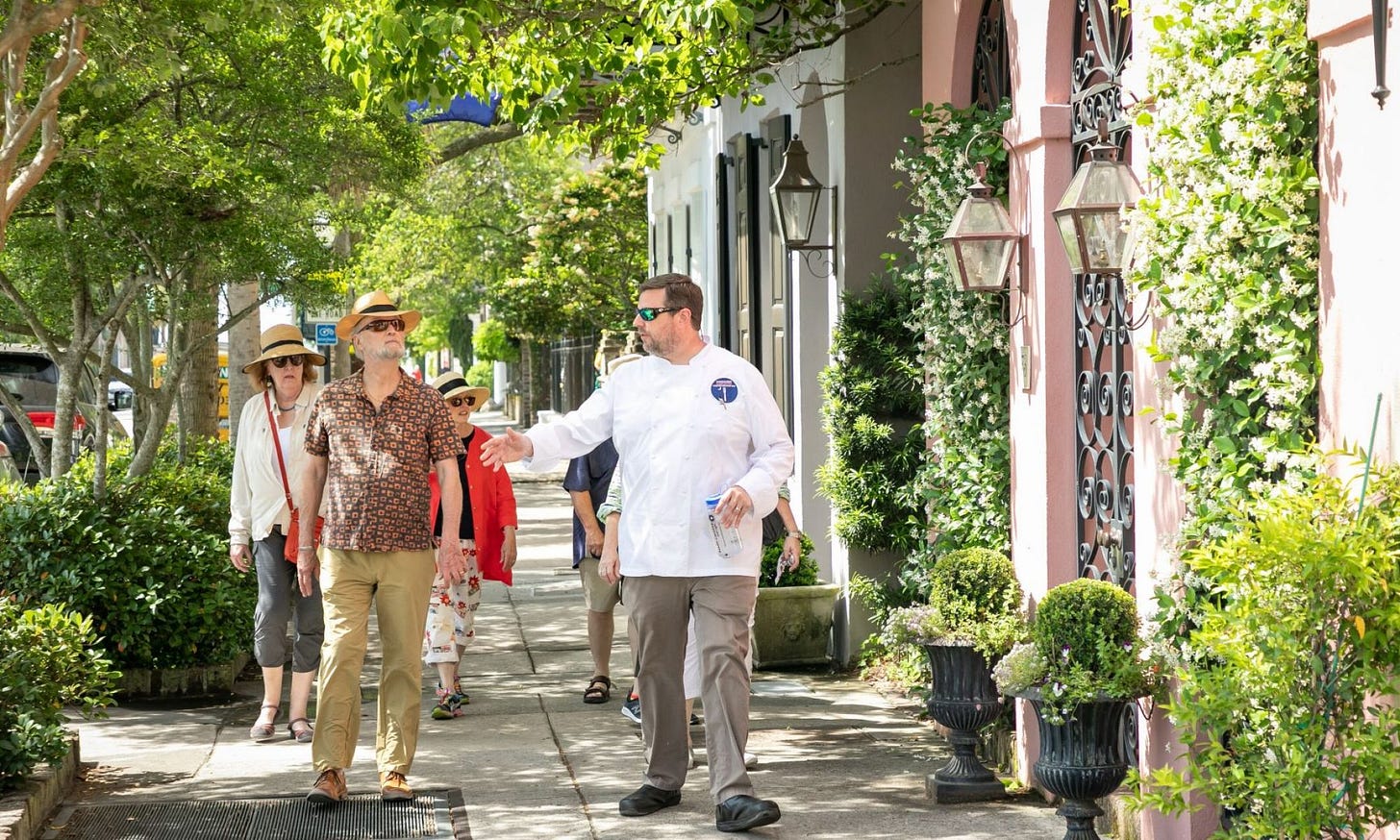#140: Famous Duels, War Songs Concert, and Undiscovered Charleston Tour
For South Carolina history lovers far and wide! Published weekly on Monday mornings. Enjoy weekly SC history articles, upcoming SC historical events, and other South Carolina recommendations.
Dear readers,
Welcome to SC History Newsletter #140!
Thank you to everyone who responded to my survey about the possibility of getting together in person someday soon. Lots of fun suggestions for meeting places as well!
In Greenville, the pollen is raining down on us. How about y’all?
I used ChatGPT to generate the following poem about the craziness of pollen in South Carolina to hopefully give everyone a laugh this morning:
Yellow Tide
In Carolina’s golden glow,
Spring arrives with sneezes slow.
The blossoms bloom, the songbirds sing,
And pollen paints the world like spring.A dust of gold on every street,
On cars, on coats, on dogs' small feet.
We breathe it in, we wipe, we sneeze—
The price we pay for blooms and trees.Azaleas blaze, the jasmine sweet,
Yet underfoot—no clean retreat.
Still, we smile through itchy eyes,
For Carolina’s springtime skies.
Thank you, ChatGPT!
Meanwhile, this weekend, I sipped on my Oliver Pluff Hibiscus Tea and was very content. Have y’all tried any of the delicious historic teas from our fabulous sponsor yet? :)
Yours truly,
Kate
(Writing from Greenville, SC)
Support the SC History Newsletter by considering heritages teas (inspired by South Carolina and American history!) from our fantastic sponsor Oliver Pluff & Co. — click on their beautiful ad below! :)
➳ Housekeeping for new subscribers!
New friends! There are over 100 previous SC History newsletters on topics ranging from the founding of Charleston, sunken Confederate submarines, railroad tunnels filled with blue cheese, and more! See our archive here!
Send me your comments or topic ideas: I love it when subscribers write to me! Have a SC History topic or question you’d like for me to write about? Have additional ideas or feedback? Just reply to this email and let me know!
Join us on social: Keep the conversation going and join over 100 other subscribers by becoming a member of our SC History Newsletter Facebook Community here!
If your email “cuts off”: In your email app or website, if my emails “cut off” for you, please click the title of the email and it will take you to the full post on the Substack. I don’t want you to miss any content!
Love the SC History Newsletter? Please click the button below to share with a friend!
➳ Featured SC History Event of the Week:
Saturday, April 26th at 10:00 am | “War Songs Concert” | South Carolina Military Museum | Columbia, SC | FREE | Website
From the event website:
“Come to the South Carolina Military Museum for a free concert lasting all day, featuring a variety of musical acts! We will have a string group playing American Revolution songs, a military brass band, old time bluegrass, and much more!”
Paid subscribers get access to my SC History Events Calendar that organizes all the upcoming SC history events I have discovered. Please let me know if you’d like to add an event to the calendar! Reply to this email to send me your events.
➳ Other SC History Recommendations
TOUR: Undiscovered Charleston Culinary Tour & Cooking Class
From the company website:
“Chef Forrest Parker, the city’s only Palmetto Guild Certified chef guide, leads you on a 1/2 day experience unlike any other. You’ll begin with a 90 minute walking tour, exploring the complicated history of the Holy City and the culinary influences that shaped Charleston into one of the world’s top food destinations. You’ll visit the not-to be missed sights, but also the lesser known and understood locations where, for example, an enslaved chef created a recipe that still helps define local menus.
The tour concludes at the cozy Bistro A Vin where you’ll relax while Chef Forrest teaches you how to cook three dishes from recipes he wrote interpreting definitive Lowcountry classics, and prepared using techniques he mastered over two decades. He’ll serve you those recipes for lunch while you enjoy a carefully curated wine pairing (or cool, delicious sweet tea if you’d prefer). You’ll go home with Chef Forrest’s recipes as his gift to you.”
➳ SC History Topic of the Week:
Famous Duels in SC History
In modern society, when two individuals have a conflict between them, there are a variety of options available to settle their differences: they can go to court, work with a mediator, or even take the fight public and let majority opinion offer a ruling. But from the Middle Ages up through the late 1800s, it was common (and legal) for two men to settle an argument by taking up arms and fighting until one of the two men died.
Perhaps the most famous duel in American History, and recently popularized on in the Broadway musical Hamilton, was between Alexander Hamilton and Aaron Burr on July 11, 1804. The death of Hamilton shocked the young American nation to its core.

By 1804, dueling had “become an American fixture” and was a practice that had been “imported” into American culture from England.
Dueling started as a less violent way to solve disputes in the European Middle Ages. It was thought that God would pass judgment during a duel and save the "right" person.
While duels had long been “fought over a woman's hand, or to defend a man's honor” — in America, dueling also came to be used to settle political differences (as in the Hamilton-Burr duel). In a new country where freedom of speech was paramount, duels often involved men defending their beliefs.
The core principle of a duel was to defend one’s honor, but at the same time, both duelists were trying to “prove themselves as leaders.” A challenge from one duelist to the other could not be ignored, or one’s “career would be destroyed.”
It didn’t help that newspapers stirred on the violence. Insults from one duelist to the other often “traveled through newspapers,” word of mouth, and town gossip. Apparently, the insults were also spread with “postings” at street corners and at taverns.
Based on a “Code Duello”, written in 1777 and widely used in Europe (and then America) here are some of the mechanics of a typical duel:
“In a typical duel, each party acted through a second. The seconds' duty, above all, was to try to reconcile the parties without violence. An offended party sent a challenge through his second. If the recipient apologized, the matter usually ended. If he elected to fight, the recipient chose the weapons and the time and place of the encounter. Up until combat began, apologies could be given and the duel stopped. After combat began, it could be stopped at any point after honor had been satisfied.”
If the duel proceeded, the duelists would arm themselves with their dueling pistols, pace away from each other (typically) 10 paces, and then turn and shoot — or (as Hamilton famously did), shoot their gun in the air to “throw away their shot.”
For our purposes today, Charleston was a “historical hotbed” for the practice of dueling.
A doctor and historian named Dr. David Ramsey claimed that the propensity for dueling in Charleston was “mostly to due to the climate because warm weather and its attendant increase of bile in the stomach generated an irritable temper which made men say and do things thoughtlessly.”
Most Charleston duels took place between the months of June through September.
While most duels in America followed the European Code Duello mentioned above, it was former Governor of South Carolina and Charlestonian John Lyde Wilson who wrote the dueling “Code of Honor” in America 1838, which outlined proper dueling etiquette. That a prominent South Carolinian wrote the “Code of Honor” is further evidence that dueling was rampant in the state.
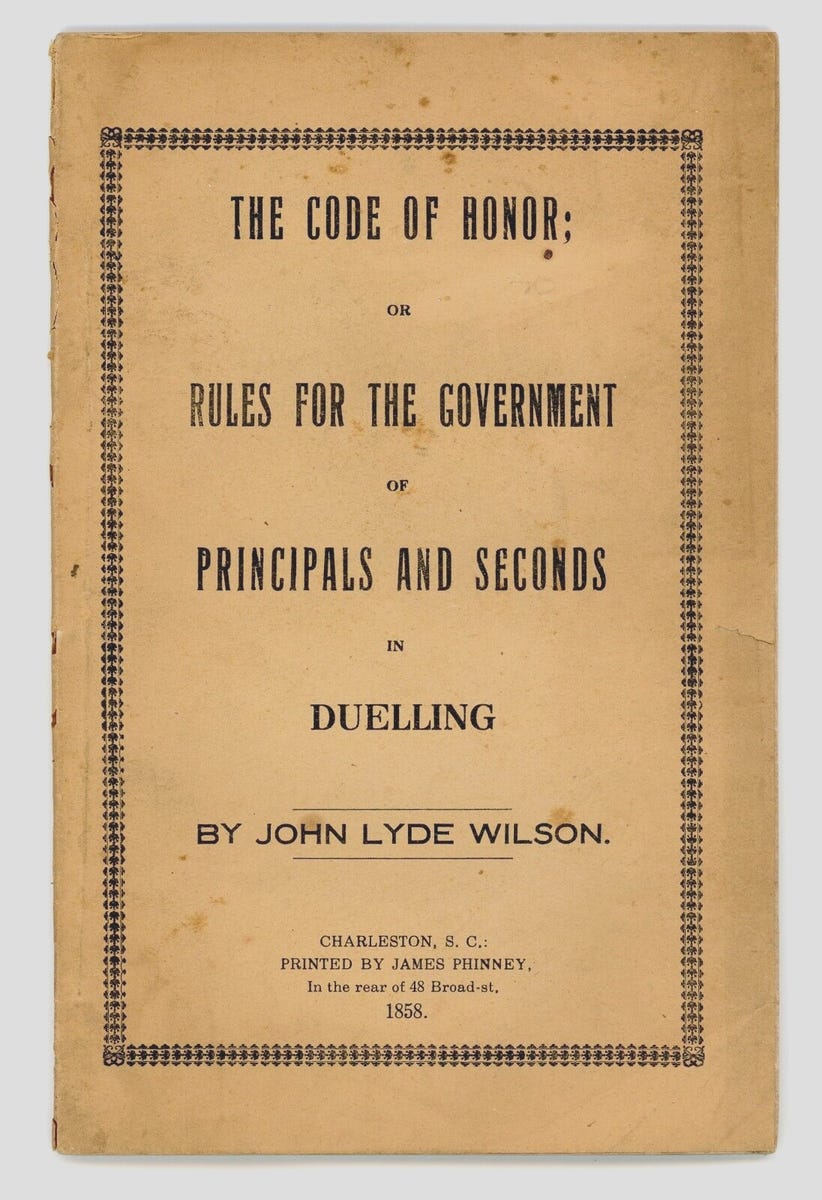
Although “not publicly or accepted or endorsed by most Charlestonians” the practice of dueling continued throughout the Civil War, but was legally abolished by the General Assembly in 1880 in South Carolina.
Duels were only meant to be settled by “gentleman equals.”
Although duels were serious, and could be bloody or lethal affairs, local newspapers “leisurely reported these bloody events.”
One local man named “Timothy Crackskull,” advertised in the City Gazette and Daily Adveriser that he had a pair of “choice and approved [dueling] pistols of the newest and most destructive construction” for rent!
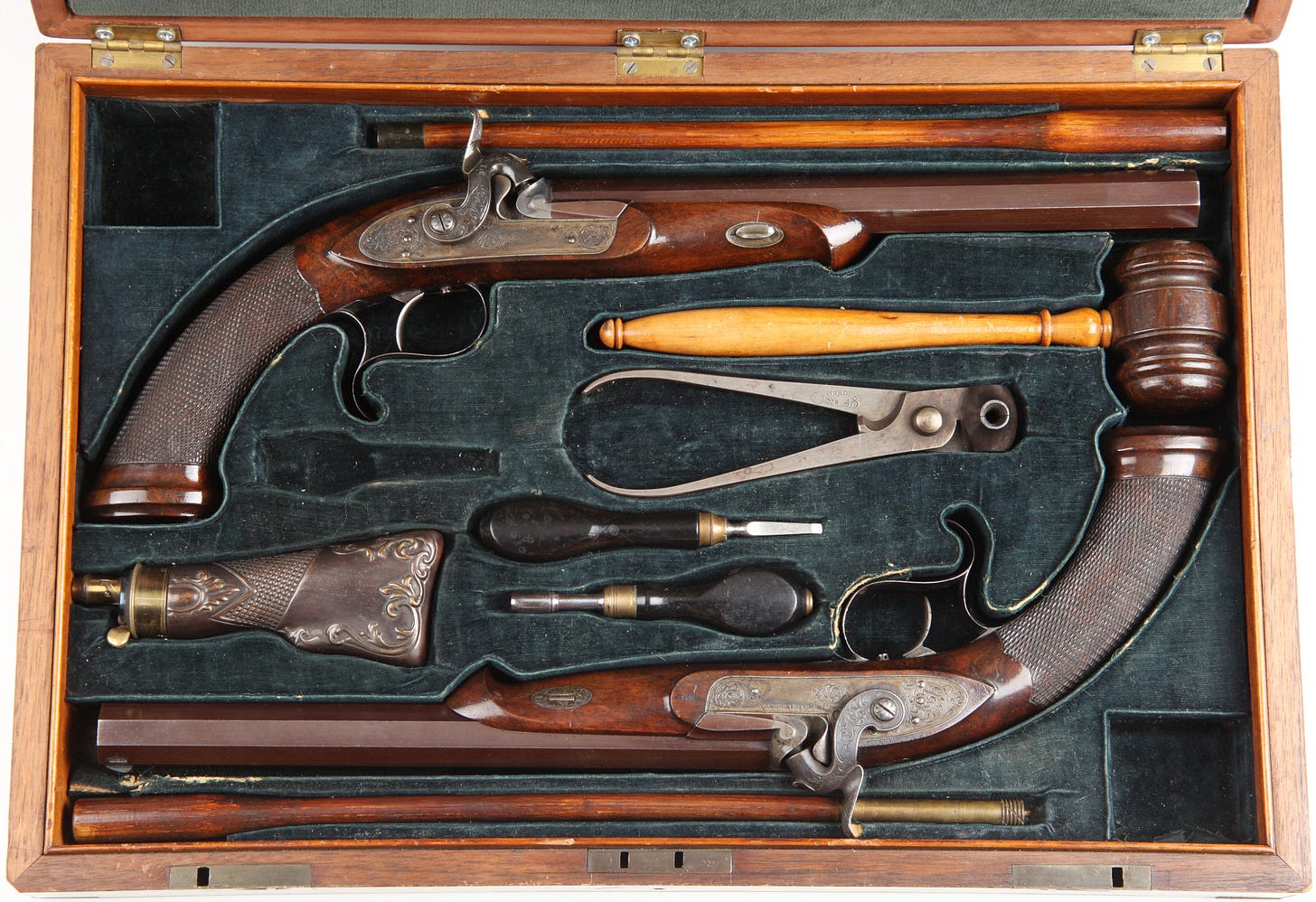
While many went duels unreported, here is the history of three known, infamous duels in South Carolina history:
Christopher Gadsden and Major General Robert Howe, 1778
You may remember our SC History Newsletter #131 on the History of the Gadsden Flag, and the flag’s creator Christopher Gadsden was a “super patriot” who agitated South Carolina to revolution.
The duel was the culmination of a long-disputed argument between the two gentlemen over rank.
Brigadier-General Howe had been put in charge of Continental Troops in South Carolina. At one point, Howe was asked to go to Georgia, upon which General Christopher Gadsden was put in charge of the troops during his absence. When Howe returned, Gadsden questioned the terms of the general’s return and believed he (Gadsden) should retain control of the troops.
From there, matters unraveled quickly. It essentially became a question of whether Congress-appointed Howe or local hero Gadsden should lead the troops.
Gadsden even wrote an “incendiary letter about Howe” in July of 1778. After this, Howe “demanded satisfaction” and a duel was set for August 30th 1778 under the Charleston Liberty Tree.
Large numbers of locals attended the duel, so much so that apparently people climbed into the Liberty Tree to get a better view. With so many onlookers, Howe and Gadsden decided to “relocate to a more private location” to commence the duel.
What happened next was quite strange and shocking.
When the duel commenced, the two men simply stared at each other in silence. According to a contemporary newspaper account, Howe finally said: “Fire, Sir.” Gadsden replied: “Do you fire first, Sir.” Howe concluded: “We will both fire together.” But, still, the two men just looked at each other. Finally, Howe lowered his gun and asked: “Why don’t you fire, General Gadsden?” “You brought me out, General Howe, to this ball play, and ought to begin the entertainment.”
Howe’s first shot barely clipped Gadsden’s ear. Gadsden then put his pistol at right angles with Howe and wasted his shot. Howe took the deliberately missed shot as an apology, although Gadsden would “insist that the apology was for the personal insults, not for contesting Howe’s right to command in the first place.” In the end, the two men parted rather amicably.
According to historical accounts, Chrisopher Gadsden “later regretted” the whole dueling affair and would later become an advocate of laws to abolish dueling in the state.
Dr. Joseph Brown Ladd and Ralph Issacs, 1786
Dr. Joseph Brown Ladd was a prominent local doctor in Charleston during the Revolutionary War. He was known for having a wonderful personality and he “ingratiated himself” into wealthy, upper class circles.
He was known for whistling while he treated his patients, and thus became known as “The Whistling Doctor.”
Dr. Ladd’s swift ascension in Charleston social status made his friend — called by some a “n’er-do-well” — named Ralph Isaacs envious.
The two gentlemen had become friends when Ladd had first moved to Charleston.
There is believed to have been an argument between the friends “over an actress both had seen perform at one of the local theaters.”
A letter written by Isaacs was circulated around social circles calling Dr. Ladd as “blasted a man who ever disgraced humanity”.
Pressured by his Charleston friends, Ladd had no choice but to challenge Issacs to a duel.
The duel was fought in “Dueler’s, or Philadelphia Alley” according to most accounts.
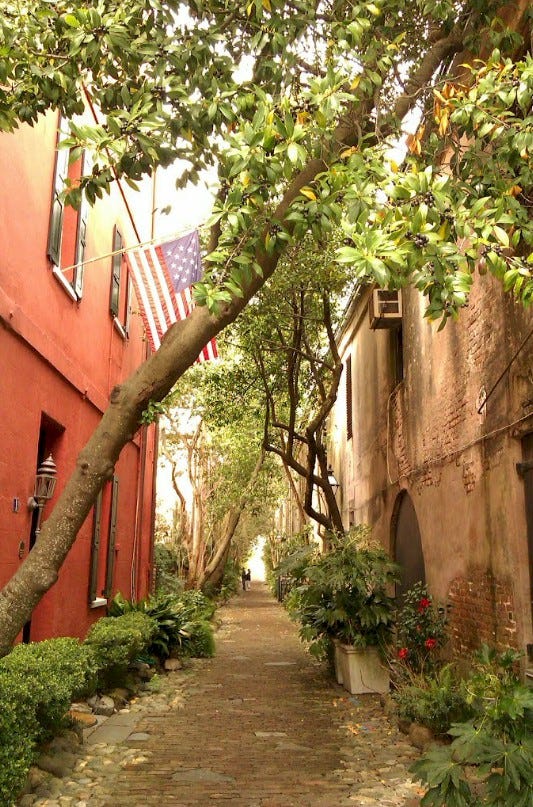
Ladd intentionally “threw” his shot away, yet had to wait for Issacs to take his turn. Issacs, still angry with Ladd but not wishing to kill the Doctor, aimed low and hit Ladd in the lower extremities causing infection and later gangrene to set in.
Doctor Joseph Ladd succumbed to his wounds two weeks later.
Today, the “Whistling Doctor” is also known as the “Whistling Ghost” of Philadelphia Alley and #59 Church Street, where he boarded.
The Cash-Shannon duel, 1880
The Cash-Shannon duel is considered to be the “last fatal, and the most documented, duel in South Carolina.”
The event occurred at Lynches River, near Bishopville, SC on July 5th, 1780 at 2:00 pm.
E.C.B Cash was a wealthy planter and lawyer from Cash’s Depot, and Colonel William Shannon was a “silver-haired” Camden lawyer.
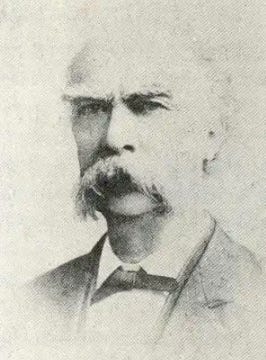

Both men had eerie similarities. Both were lawyers, both had served as Confederate colonels, and both were members of the state House of Representatives.
The conflict between Cash and Shannon “festered for 27 months, spiraling violently out of control. Growing out of assorted lawsuits, ensuing settlements, and violent-natured people, things came to a head when Shannon alleged that there were monetary shenanigans and fraud involving Cash’s wife, who was ‘stricken speechless and died.’”
Cash challenged Shannon to a duel. Well-dressed and using all the proper manners, the 2 principals “exchanged pleasantries, took their arranged places on the field, leveled their pistols at each other and fired”.

According to eye witnessed, Shannon fired first, but his bullet hit the ground about five feet in front of Cash, sending sand into Cash's eyes. Cash would later say he thought he was hit and returned fire, the bullet piercing Shannon's heart.
Within minutes, Shannon, father of 13 children, was dead.
This duel sparked public sadness and outrage and was “the final straw” for most South Carolinians. The archaic, seemingly barbaric, practice of dueling was soon outlawed. It had “revealed its total senselessness in a new post-War South.”
According to an article from GoUpstate, the descendants of Cash and Shannon still feel the sting of this awful duel to this day. "The entire Shannon family has a very personal feeling about Colonel Shannon and what happened, and that feeling is not diminished in any way by the passage of 125 years," said William Shannon Nelson II, Shannon's great-great-grandson.
25 years ago, both families tried to arrange a joint reunion. But several of Colonel Shannon's descendants — women in their 80s — objected when asked about the possibility.
If you voted just “OK” on the newsletter today, I want to hear from you! Reply to this email and send me your feedback. :)
➳ Sources — Famous Duels in SC History
“Dueling.” South Carolina Encyclopedia, 17 Aug. 2016, www.scencyclopedia.org/sce/entries/dueling/. Accessed 8 Apr. 2025.
“Duel.” Encyclopædia Britannica, www.britannica.com/topic/duel. Accessed 8 Apr. 2025.
“Economics and the Art of the Duel.” EconPort, www.econport.org/content/teaching/modules/NFG/Duelists.html. Accessed 8 Apr. 2025.
“Gadsden, Christopher.” South Carolina Encyclopedia, www.scencyclopedia.org/sce/entries/gadsden-christopher/. Accessed 8 Apr. 2025.
“History of Dueling in America.” American Experience, PBS, www.pbs.org/wgbh/americanexperience/features/duel-history-dueling-america/. Accessed 8 Apr. 2025.
History Detectives. “Politics and Pistols: Dueling in America.” PBS, www.pbs.org/opb/historydetectives/feature/politics-and-pistols-dueling-in-america/. Accessed 8 Apr. 2025.
Lowcountry Walking Tours. “Charleston’s Historic Duels.” Lowcountry Walking Tours, www.lowcountrywalkingtours.com/charleston-stories/charleston-duels/. Accessed 8 Apr. 2025.
“Pistols at Dawn: Twenty Paces.” NRA Blog, 21 Jan. 2016, www.nrablog.com/articles/2016/1/pistols-at-dawn-twenty-paces. Accessed 8 Apr. 2025.
“Pistols at Ten Paces.” HistoryNet, www.historynet.com/pistols-ten-paces/. Accessed 8 Apr. 2025.
Ross, Tara. “This Day in History: Gadsden Challenges Howe to a Duel.” TaraRoss.com, 13 Sept. 2021, www.taraross.com/post/tdih-gadsden-howe. Accessed 8 Apr. 2025.
“Rules of Dueling: Code Duello.” American Experience, PBS, www.pbs.org/wgbh/americanexperience/features/duel-code-duello-rules-dueling/. Accessed 8 Apr. 2025.
“Today in Darlington County History: The Cash-Shannon Duel.” Darlington County Museum, 5 July 2016, darlingtoncountymuseum.org/2016/07/05/the-cash-shannon-duel-today-in-darlington-county-history/. Accessed 8 Apr. 2025.
“‘Last Duel’ in State: Descendants Try to Bury Hatchet.” GoUpstate, 6 July 2005, www.goupstate.com/story/news/2005/07/06/last-duel-in-state-descendants-try-to-bury-hatchet/29763298007/. Accessed 8 Apr. 2025.














